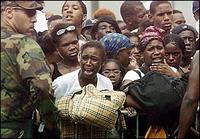The Newspaper of Record on our National Disaster
 The worthies of the Times try to come to grips with the debacle. Paul Krugman writes of our "Can't-Do Government":
The worthies of the Times try to come to grips with the debacle. Paul Krugman writes of our "Can't-Do Government": At a fundamental level, I'd argue, our current leaders just aren't serious about some of the essential functions of government. They like waging war, but they don't like providing security, rescuing those in need or spending on preventive measures. And they never, ever ask for shared sacrifice.
Yesterday Mr. Bush made an utterly fantastic claim: that nobody expected the breach of the levees. In fact, there had been repeated warnings about exactly that risk.
So America, once famous for its can-do attitude, now has a can't-do government that makes excuses instead of doing its job. And while it makes those excuses, Americans are dying.
Floyd Norris notes that conserving energy is a "such a 70's idea":
David Brooks draws lessons from past disasters:WHERE are the plans for energy conservation? They are needed now.
The markets think that the United States will not have enough refined petroleum products to meet demand for at least a few months. The response of the government has been to relax environmental rules, which will allow more production, and to release crude oil from the Strategic Petroleum Reserve, which will do nothing to deal with inadequate refining capacity.
Left to its own devices, of course, the market will allocate scarce resources. If there is a shortage of gasoline or home heating oil, prices will rise until demand falls off. Refiners will do very well financially, and gas station operators may find that their margins are also great, albeit with the added irritation of angry customers yelling about profiteering.
But the nature of energy demand is that it is slow to react to price changes. In the short term, a person cannot stop driving to work. Longer term, that person can get a car with better fuel efficiency or move closer to the job - both happened after past oil spikes.
Civic arrangements work or they fail. Leaders are found worthy or wanting. What's happening in New Orleans and Mississippi today is a human tragedy. But take a close look at the people you see wandering, devastated, around New Orleans: they are predominantly black and poor. The political disturbances are still to come.
(Photo: Willie J. Allen Jr./St. Petersburg Times)



0 Comments:
Post a Comment
<< Home